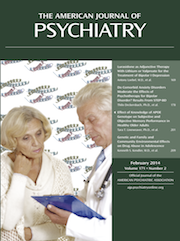Response to Carnahan
To the Editor: We thank Dr. Carnahan for his letter commenting on our study published in the Journal. We agree that, in general, observational studies can miss essential medical aspects of the treatments that are important to the study endpoints. However, there are two aspects of our study that are relevant for the interpretation of our findings. First, we examined a group of probable Alzheimer’s disease patients with mild-to-moderate dementia who were followed as outpatients at a research center for Alzheimer’s disease. Second, all patients were carefully evaluated by geriatric psychiatrists and neurologists, and they did not have a history of severe mental illness or medical-neurological disorder (e.g., strokes) before the study entry. These are the most important differences between our study and those from the majority of the placebo-controlled trials. Those studies were conducted in very heterogeneous groups of institutionalized patients with advanced dementia syndromes, some with Alzheimer’s disease, some with other disease processes that can cause dementia, some with lifetime history of psychotropic exposure, and some with multiple life-threatening comorbid conditions (see the Introduction of our article). However, the finding that the psychotic/agitated phenotype is the most important predictor of mortality and not the medication used to treat it should not be viewed as if these medications were completely safe. Indeed, they should continue to be used only with extreme caution.



